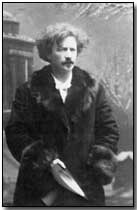Primary Documents - Ignace Paderewski on the League of Nations, 18 September 1919
 With Germany defeated in
November 1918 the path was cleared for a newly constructed Polish republic
to be established with Allied backing; this was duly declared on 10 February
1919. This was however by no means the end of uncertainty for Poland,
with the ultimate makeup of Europe yet to be agreed at the Paris Peace
Conference, and with military disagreements with Russia, the Ukraine and
Czechoslovakia rumbling on.
With Germany defeated in
November 1918 the path was cleared for a newly constructed Polish republic
to be established with Allied backing; this was duly declared on 10 February
1919. This was however by no means the end of uncertainty for Poland,
with the ultimate makeup of Europe yet to be agreed at the Paris Peace
Conference, and with military disagreements with Russia, the Ukraine and
Czechoslovakia rumbling on.
Click here to read the statement issued by the Polish Regency Council - established by the country's wartime German occupiers - on 11 November 1918 (the date of the armistice) which announced that General Josef Pilsudski, newly freed from German incarceration, was to be appointed to military command of Poland's Army. Click here to read a subsequent decree, issued three days later, in which the Regency Council formally announced its own dissolution in favour of Pilsudski pending assembly elections. Click here to read a statement issued by Pilsudski on the same day in which he outlined his immediate plans.
Click here to read an interview conducted with Pilsudski by a French newspaper in February 1919. Click here to read the text of the U.S. government's formal recognition of the Polish government, by now politically led by Ignace Paderewski (with Pilsudski's blessing while the latter oversaw military matters). Click here to read an address issued by Paderewski in May 1919 in which he summarised events to date at the Paris Peace Conference. Click here to read a statement issued by Paderewski in September 1919 in which he expressed his support for Polish entry into the League of Nations.
Click here to read a statement issued by Herbert Hoover - head of the U.S. reconstruction organisation in Europe - dated August 1919 in which he documented his reservations with regard to the speed with which Poland's economic infrastructure could be rebuilt.
Statement by Paderewski on the League of Nations, 18 September 1919
From a Polish point of view, our one hope of future security as a State lies in the League of Nations. Upon it, and I fear upon it alone, depend the liberty of the Polish people and the successful development of democratic and liberal government in Poland.
Standing, as we are, between Germany on one side and Russia on the other, we cannot hope to maintain our integrity during these years, while we build up the strength of our people, unless we have the protection of the League.
Poland at the present moment has 500,000 men under arms. Our people are short of food supplies, short of clothing, short of many of the necessaries of life. We are compelled to make every sacrifice to sustain the army, and this, with our population needing its resources for the up-building of the nation, in order that we may protect ourselves from encroachment.
Today we are defending 1,500 miles of front against Bolshevist forces, and in so doing, we stand as the front line in Europe against Bolshevist invasion from the east.
We are endeavouring to maintain this front line and at the same time to achieve an economic stability, to recuperate our people from the effects of repeated invasions of German and Russian armies. The task is a terrible one. The tax upon our strength will be too great unless we can have the assurance that there will be a body in the world to whom we can appeal for aid in the righting of our wrongs.
Poland has set up a democracy under the inspiration of the American people. Had it not been for American intervention in Europe we might possibly have had some semblance of independent Government under an autocratic overrule, but with American intervention and American help we have sought to establish not only the independence of the State, but also the internal liberty of our people, through the difficult road of democracy.
The pressure is upon us on all sides through military action and through Bolshevist propaganda and an intense propaganda from Germany. Unless we have a protective power in the world, under whose strength we can secure an opportunity for peaceful development and the solution of our internal problems, free from distracting and antagonistic influences, I fear for the safety of our democracy.
The great power and the support which it may furnish need not be military, its moral and economic force is all that we ask, and that power is the League of Nations.
Source: Source Records of the Great War, Vol. VII, ed. Charles F. Horne, National Alumni 1923
Battle Police were military policemen deployed behind an attack to intercept stragglers.
- Did you know?
